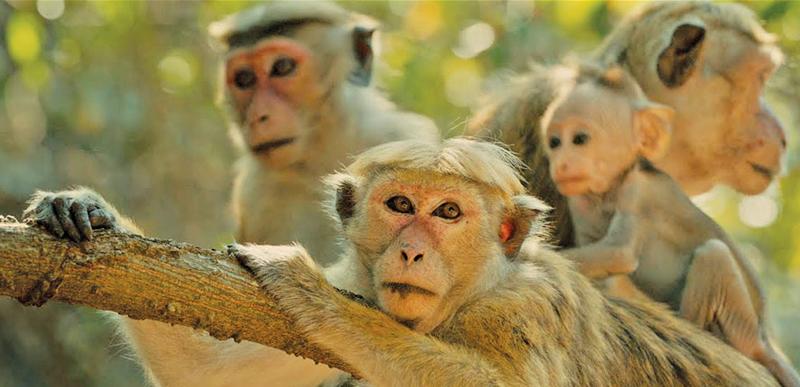
The Ministry of Wildlife and Forest Conversation plans to sterilize monkeys, wild boar, peacocks, giant squirrels and porcupines to minimise damage caused by wildlife to farmlands, a press communiqué issued by the Ministry of Wildlife stated last week.
Officials of the Ministries of Wildlife and Agriculture held a discussion and a committee was set up by Minister of Agriculture Mahindananda Aluthgamage to evaluate the proposals last week.
Moves to sterilize selected wildlife and move them from forests near farmlands were discussed.
Wildlife attacks
According to a study conducted by the Hector Kobbekaduwa Agrarian Research and Training Institute (HARTI) in 2018, it has been revealed that the annual crop damage caused by wildlife is around 40 percent.
 Therefore, the Ministry of Agriculture has paid close attention to wildlife management and crop damage prevention in the recent past. In 2016, a study revealed that damage to crops by wildlife in the dry zone of Sri Lanka was 10 percent of its total yield, the HARTI stated. Accordingly, 15 percent of green gram, eight percent of maize, nine percent of groundnut and nine percent of sugarcane cultivation have been affected by wildlife.
Therefore, the Ministry of Agriculture has paid close attention to wildlife management and crop damage prevention in the recent past. In 2016, a study revealed that damage to crops by wildlife in the dry zone of Sri Lanka was 10 percent of its total yield, the HARTI stated. Accordingly, 15 percent of green gram, eight percent of maize, nine percent of groundnut and nine percent of sugarcane cultivation have been affected by wildlife.
Another study conducted in 46 Grama Niladhari Divisions in Ampara and Moneragala districts during the Yala and Maha seasons in 2017, crop damage by wildlife was reported as 22 percent, maize 15 percent, groundnut 23 percent, Kurakkan 41 percent, cowpea 39 percent and mango 41 percent.
In the wake of continuous wildlife attacks to farmlands, farmers have urged authorities to provide them air rifles and ammunition to keep pests at bay.
However, the Ministry of Agriculture has taken steps to consider other alternatives such as construction of electric fences, research incentives for innovations, adoption of correct cultivation practices, planting of fodder and wildlife repellent plants. Due to the damage caused by wild animals in the past few years, the contribution of food crops, except fruit crops to the GDP has decreased, HARTI stated.
Following the recent discussion by both ministry officials, an expert committee has been appointed chaired by agri-sector expert, Thilak Kandegama.
“In fact I did not even know until I had been appointed to the committee” Kandegama told the Sunday Observer. Kandegama, a veteran in the field of agriculture, particularly in traditional farming, however believes that the committee would be able to find better solutions than sterilising wildlife.
“Our traditional farming techniques include, many ways of repelling wildlife from farmlands. We do not need to conduct sterilisations to protect our farms” he said. Out-spreading farmlands is one of the key reasons for wildlife encroachment of farmlands, Kandegama said, “In the past we had a better forest cover than now. Still our ancestors managed to cultivate farmlands. We need to bring that traditional knowledge in to practice”.
The committee is planning to meet tomorrow to further discuss proposals.
Of the pests monkeys are the most troublesome. Charmalie Nahallage, a professor in anthropology of the University of Sri Jayewardenepura who has done extensive studies on the subject said. She said, “The monkeys’ diet is omnivorous and includes fruits, vegetables, grains, insects and smaller prey. They prefer to live close to human habitation because of their extensive diet. It gives them an opportunity to easily adapt to any environment. They are arboreal and terrestrial.”
“This is not practical at all” wildlife enthusiast and environmentalist Nayanaka Ranwella said.
“No one has a right to sterilise an animal. Secondly, that is immoral. Public officials cannot take such a decision without proper research,” Ranwella said. He said agriculture sector officials should consider introducing newfarming technologies to the country where damage to harvests could be maximised without extending farmlands. “On the other hand due to lack of post harvest management technology , such as storing and transporting a large quantity of harvest is lost but it is yet less compared to the damage caused by wildlife” he said.
“As far as I know there is no such thing in the world called, sterilisation pills. Therefore, if wildlife is to be sterilised they have to perform surgeries. Sterilisation would affect the ecological balance and would endanger the existence of humans too” he said.
